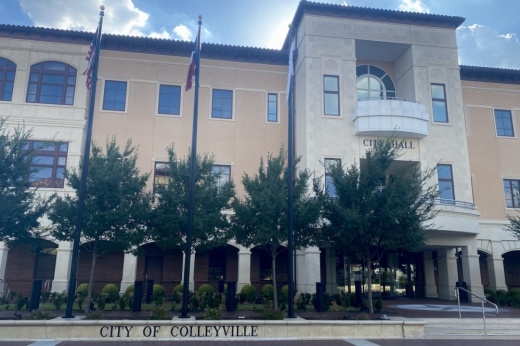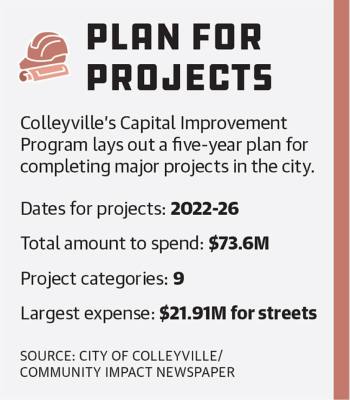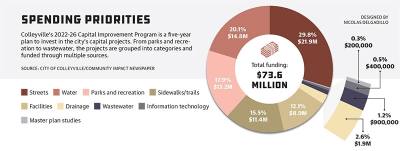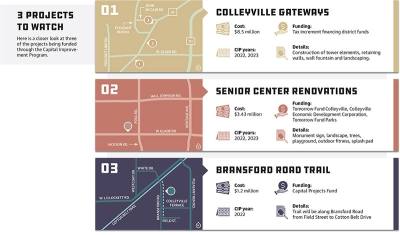The 2022-26 Capital Improvement Program, known as the CIP, outlines plans to spend about $73.6 million on a host of projects, from new trails to fire station renovations to roadwork, including the Glade Road construction.
“The benefits of the CIP [are to] provide a link to the strategic plan and the city’s budget, to support the city’s long-term goal and focus on serving the city’s infrastructure while ensuring efficient use of public funds,” said Larry Wright, city engineer and interim public works director, in a July 6 CIP workshop.
Capital projects are defined as requiring an investment of $50,000 or more and having a useful life of at least five years, the CIP stated.
Assistant City Manager Adrienne Lothery said CIP projects come from Colleyville City Council priorities, a department’s recommendation, or when grants funds or partnerships become available with other cities or the county.
“Every project executed serves to maintain or improve the quality of life for residents,” Lothery said via email. “The CIP is a plan.”
While the projects and the timelines have been approved by council, they are subject to change based on priority levels, financing opportunities or changes sought by the mayor and council, city documents stated.
The CIP also has no set funding source. The Colleyville Economic Development Corporation, which gets its revenue from a half-cent sales tax, has funded projects as well as the Crime Control and Prevention budget, water impact fees, the tax increment financing district fund and other funds.
The plan states that many of the projects are “multiyear in nature” and do not fit within the city’s annual budget.
Project breakdown
CIP project categories range from $200,000 for master plans and studies to $21.9 million for streets.
“The Capital Improvement [Program] provides an opportunity to consider all of the city’s capital needs in these coming years and determine priorities for each of [them],” Wright said.
The largest portion of the CIP funding goes toward streets. Costs are expected to reach about $22 million. The plan will fund projects related to bridges, intersections, pavement markings, reconstruction, maintenance, and school and neighborhood safety.••For this category, projects include the expansion of the John McCain bridge, intersection improvements on Glade Road at Bluebonnet Drive and part of the Pleasant Run Road Project, which includes full depth asphalt rehabilitation and the upsizing of an existing water line.
The second largest portion of CIP will fund updates related to parks and recreation. About $13.22 million will cover different projects, such as the construction of City Park’s playground and splash pad, renovations to the senior center and the Colleyville Gateways.
Colleyville is also planning to spend nearly $11.38 million on improvements to sidewalks and trails throughout the city.
Planned projects include the Bedford Road Trail, which will provide a connection from Glade Road to Sparger Park, and the Bransford Trail that will connect Field Street to Shelton Drive.
About $8.89 million is expected to go toward facilities projects, such as renovation to the public works service center and renovations to Fire Station No. 3.
For drainage, city officials estimate spending about $1.9 million, according to the plan. These projects will “optimize the performance and maintainability” of the city’s drainage system, such as water facilities, stormwater runoff and flood risks, the CIP stated.
Aligning with city’s character
The Colleyville Gateways, which will line portions of SH 26, are part of the city’s effort to beautify Colleyville Boulevard.
Plans for the Colleyville Gateways began under former Mayor Richard Newton, who was first elected to the position in 1992.
Mayor Bobby Lindamood said Newton’s idea was to brand where Colleyville began and ended. He said people driving through town often do not know whether “they are in Grapevine, North Richland Hills or Bedford.”
The Gateways will help with that, Lindamood said.
The city is constructing three gateways: the Pastoral Gateway at John McCain Road, the Main Street Gateway at Main Street and the Creekside Gateway near Brown Trail. The Pastoral Gateway will have a Colleyville identity sign, a tower, stone walls, flagstone and a native meadow, according to city documents. The Main Street Gateway and Creekside Gateway will also have the tower elements as well as landscaping.
Lindamood said Colleyville has high standards when it comes to construction, and the city demands a high level of quality when working with contractors and companies.
“That’s what makes Colleyville unique,” Lindamood said. “We actually care for those open spots and that hometown feel.”
Lindamood referred to Main Street as having been a “sore spot” in the city for several years with businesses closing or moving out of the plaza. But, he said the city’s commitment to quality and its investment into downtown has attracted new businesses.
Lindamood said Colleyville is at around 94% for business capacity, meaning most of the city’s allotted space for businesses to rent or own is occupied.
“We are a jewel in the middle of the metroplex,” Lindamood said. “People are going to see that we are actually investing into Colleyville to make it look beautiful.”








